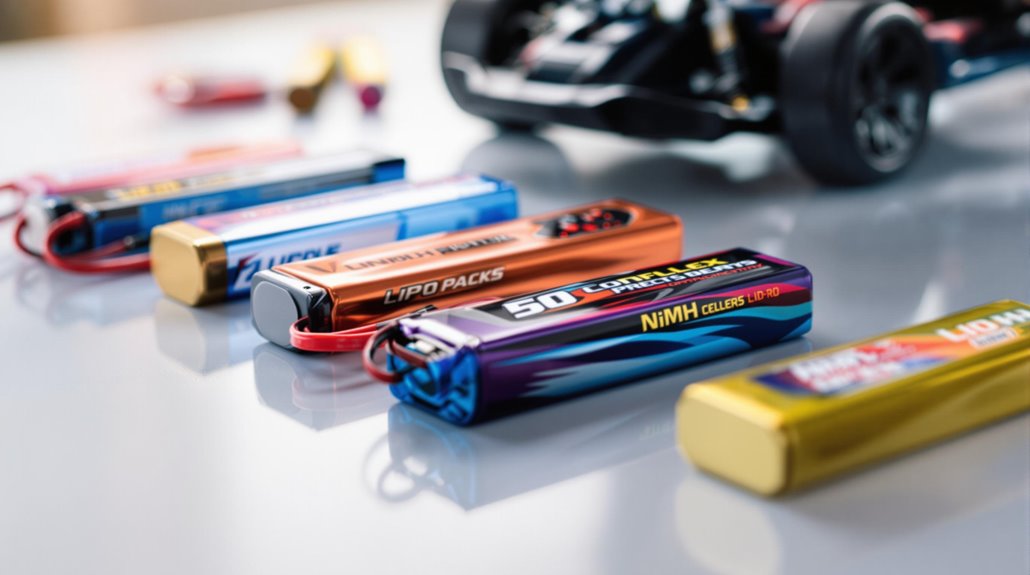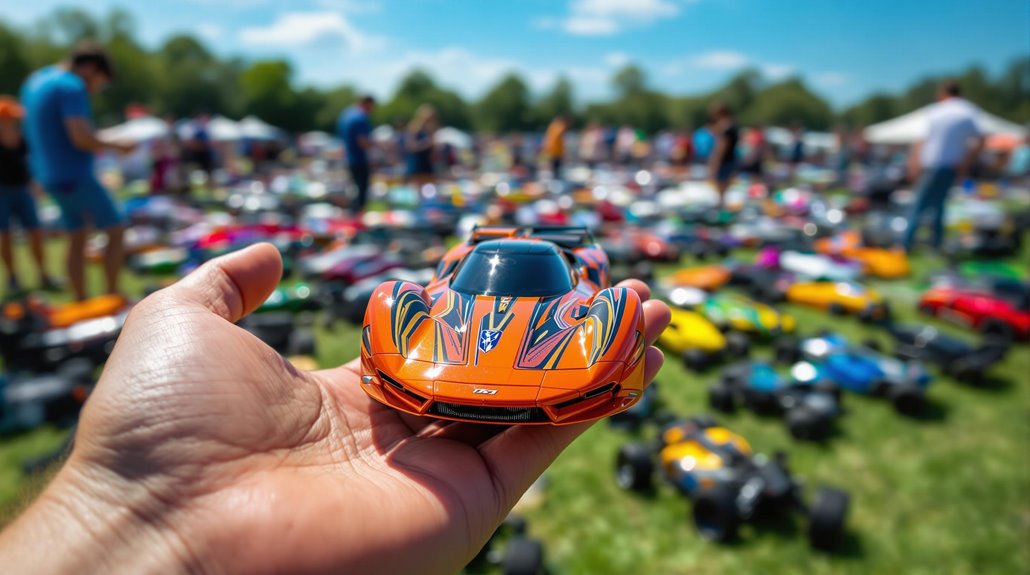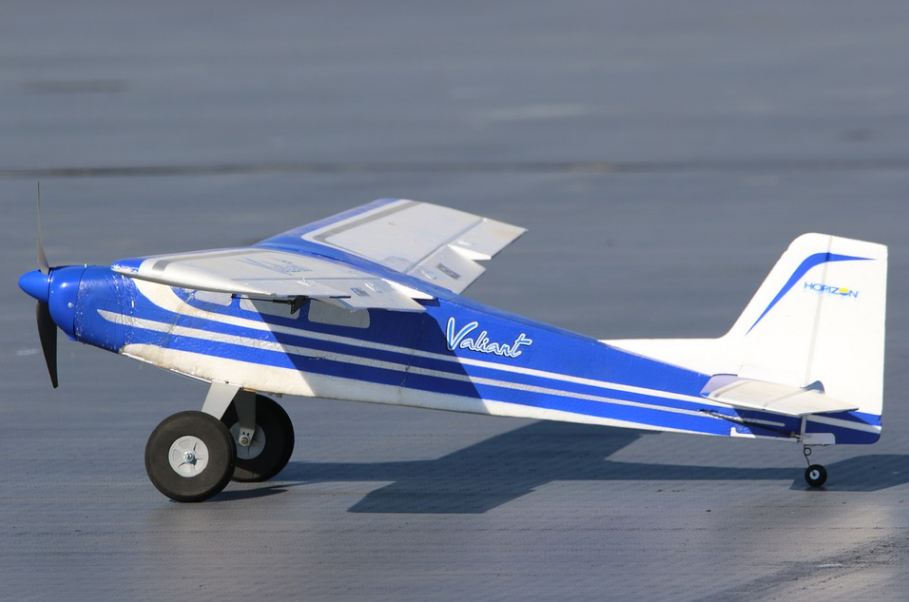Considerations Before Buying Your First Radio Controlled Vehicle

Before you buy your first radio-controlled vehicle, consider a few important factors. Start by choosing between electric and nitro options—electric models are easier to operate and maintain. Look for a Ready-to-Run (RTR) vehicle with sealed electronics for durability. Don't forget about battery types; nickel-metal hydride (NiMH) is budget-friendly, while lithium polymer (LiPo) offers better performance but needs careful handling. Establish a budget and factor in additional costs like batteries and spare parts. Engaging with local clubs or online forums can enhance your experience, providing support and tips from fellow enthusiasts. There's more to explore on this exciting journey!
Key Takeaways
- Choose a Ready-to-Run (RTR) model for convenience and ease of use, especially for beginners.
- Opt for electric RC vehicles for simpler operation and maintenance compared to nitro models.
- Consider battery types carefully; NiMH is good for beginners, while LiPo offers higher performance for advanced users.
- Establish a budget that includes the initial cost of the vehicle and additional expenses for batteries and maintenance.
- Engage with local clubs and online forums for support, knowledge sharing, and community involvement in the RC hobby.
Choosing the Right RC Vehicle
Choosing the right RC vehicle can feel overwhelming, but it doesn't have to be. Start by opting for a Ready-to-Run (RTR) model, which comes complete with everything you need, like the remote, batteries, and charger. This way, you'll hit the ground running without any additional setup hassles.
When it comes to size, a 1/10 scale 4WD off-road basher, such as the ARRMA GORGON, is an excellent choice. It strikes a balance between durability and versatility, making it suitable for various terrains. You'll find that electric RC cars are easier to operate and maintain compared to nitro models, making them perfect for beginners.
Durability is key, so look for models with sealed electronics that offer water resistance and robust construction for outdoor use. This will ensure your vehicle can handle different environments without compromising performance. Adhering to best practices for new RC pilots can significantly enhance your skill development and enjoyment of the hobby.
Finally, take the time to research and read reviews on popular brands like Traxxas and Associated. This step will help you invest in a reliable and well-supported model that meets your needs, making your entry into the RC world enjoyable and hassle-free.
Electric vs. Nitro Options
When diving into the world of radio-controlled vehicles, you'll quickly notice the debate between electric and nitro options. For first-time hobbyists, electric cars are generally the way to go. They're easier to operate and require minimal maintenance compared to nitro cars, which need regular upkeep and special fuel. Plus, advancements in battery technology, like lithium polymer (LiPo) batteries, offer efficient energy storage that results in longer run times. Brushless motors provide more power and customization options, making electric RC cars a compelling choice for those seeking performance without the hassle of a combustion engine.
Electric RC cars equipped with brushless motors can achieve impressive speeds of over 40 mph, making them exciting yet manageable for beginners. On the other hand, nitro cars can also reach similar speeds but often demand more skill to control effectively due to their complexity. While nitro cars provide a thrilling realistic engine sound, they can be noisier and emit fumes, which makes them less suitable for indoor use.
If you're looking for a straightforward, enjoyable experience right out of the box, electric options are ideal. However, if you're willing to invest time in maintenance and performance tuning for the thrill of nitro cars, you might find that rewarding as well.
Understanding Battery Types

A variety of battery types are available for radio-controlled vehicles, each offering distinct advantages and challenges. For your first RC car, you might consider Nickel-metal hydride (NiMH) batteries. They're economical and provide moderate performance, making them a common choice for beginners. However, if you're looking to upgrade later, Lithium polymer (LiPo) batteries could be a great option.
They're lighter, hold more energy, and deliver higher performance, making them the preferred choice for experienced users. Keep in mind that LiPo batteries require special care. You'll need to maintain proper voltage to extend their lifespan and ensure optimal performance. It's also wise to have multiple batteries on hand for extended playtime, as many standard kits come with low-capacity batteries that might not last long enough for your needs. When it comes to charging, always use a compatible charger.
Cheap chargers might only work with specific battery types, and investing in a fast charger can significantly reduce your charging time. Understanding these battery types will help you make informed choices and enhance your RC experience. For those interested in electric RC cars, they are generally more affordable and require less maintenance compared to their Nitro counterparts.
Essential Maintenance Tools
Maintaining your radio-controlled vehicle requires having the right tools at your disposal to ensure optimal performance and longevity. Investing in essential maintenance tools not only simplifies repairs but also allows for customization, enhancing your overall RC experience. Here are some must-have tools for your toolkit:
- Hex drivers: Sizes 1.5, 2.0, 2.5, and 3.0mm for assembly and repairs.
- Nut drivers: Common sizes like 7mm and 5.5mm for securing various components.
- Slip-joint pliers: Useful for gripping and adjusting small parts during maintenance.
- Curved Lexan scissors: Ideal for body trimming and applying decals with precision.
- Hobby knives: Essential for detailed cutting tasks and modifications.
When selecting your first RC vehicle, it's crucial to consider RC car scaling as it affects size, variety, and cost.
Getting Started With RC Vehicles

Starting your journey into the world of radio-controlled vehicles can be exciting and a bit overwhelming. To make it easier, consider choosing a Ready-to-Run (RTR) model. These come with everything you need, including a remote, batteries, and a charger, making them ideal for beginners. When buying RC cars, electric-powered options are recommended due to their ease of operation and minimal maintenance. Plus, advancements in technology allow them to reach impressive speeds.
To further enhance your experience, consider taking your child to an RC track or race course where they can enjoy real-life experiences and excitement. Before hitting the track, familiarize yourself with the basic controls and features of your vehicle. This will enhance your driving experience and ensure safety, especially outdoors. It's also a good idea to invest in essential maintenance tools like hex drivers and pliers. These tools will help you with assembly and repairs, keeping your RC vehicle in optimal condition.
Don't hesitate to join local hobby clubs or engage in online forums. Connecting with experienced hobbyists can provide valuable insights and support as you navigate your entry into the RC community. With the right approach, you'll quickly become confident and skilled in your new hobby!
Community Support and Resources
The vibrant world of radio-controlled vehicles thrives on community support and resources that can make your experience more enjoyable and enriching. As you embark on this exciting journey, tapping into these resources can significantly enhance your skills and enjoyment. Here are some ways to engage with the RC community:
- Local Clubs: Join a club to meet fellow RC enthusiasts, participate in events, and learn from hands-on experiences.
- Online Forums: Connect with experienced hobbyists through forums and social media, where you can ask questions, share tips, and troubleshoot issues.
- Expert Advice: Local hobby stores often provide valuable insights and repair services, fostering community engagement among RC enthusiasts.
- Community Events: Attend RC races or meetups to build relationships and immerse yourself in a shared passion for the hobby.
- Horizon Hobby Support: Take advantage of expert product support and a robust return policy for added confidence in your purchases.
- Reviews from other enthusiasts can also offer valuable indicators of quality and performance, helping you make informed purchasing decisions.
Budgeting for Your Purchase

Engaging with the RC community not only enhances your experience but also helps you understand the financial aspects of your new hobby. When budgeting for your first RC vehicle, establish a clear figure since prices can range from $100 for entry-level models to over $600 for hobby-grade options. It's crucial to select a vehicle that fits within your financial limits.
Don't forget to factor in additional costs like batteries, chargers, and maintenance tools, which can add another $50 to $200 to your total budget. While hobby-grade RC cars may seem pricier, they offer superior durability and performance, making them a worthwhile long-term investment compared to cheaper toy-grade alternatives.
Research specific models within your budget range, with entry-level trucks typically costing between $100 and $300 and mid-range options ranging from $300 to $600. Always aim for quality over initial cost; investing in a reliable model will save you money in the long run through reduced maintenance and the need for replacements. Consider exploring customization options for your RC car, as various aftermarket parts can enhance performance and personalize your vehicle. By setting a thoughtful budget, you'll be well on your way to enjoying the thrilling world of RC cars.
Size and Performance Considerations
Choosing the right size for your radio-controlled vehicle plays a crucial role in its performance and usability. The most common size, the 1/10 scale, strikes a balance between portability and diverse driving experiences. However, larger models, like 1/8 or 1/5 scale, excel in off-road performance but can be cumbersome to transport. On the other hand, smaller scales, such as 1/16, are perfect for indoor use but may struggle on rough terrains. When considering size, keep these factors in mind:
- Performance: 4WD vehicles offer superior handling and control on various surfaces.
- Scales: Choose a scale that fits your environment and intended use.
- Transportability: Consider how easy it is to carry and store your vehicle.
- Spare Parts: Larger models often have a wider selection of aftermarket upgrades and repairs.
- Terrain Compatibility: Ensure your vehicle can handle the types of surfaces you plan to drive on.
- Truggies combine features of stadium trucks and buggies, offering excellent off-road capabilities while maintaining durability.
Researching Brands and Models

Once you've decided on the size and performance characteristics that suit your needs, it's time to explore the brands and models available in the radio-controlled vehicle market. Start by researching brands like Traxxas, Associated, and HPI Racing, which are popular for their quality and performance. Look into customer reviews to get a sense of how different models hold up in real-world situations. Watching performance videos can also provide insights into reliability and capabilities.
Next, compare specifications such as motor type and drive system. This step ensures that the model aligns with your driving preferences and skill level. Joining online forums can significantly enhance your understanding of the market—experienced hobbyists often share valuable feedback about the brands and models they trust. It's also important to consider the cost and availability of spare parts to ensure you can maintain your vehicle and minimize downtime.
Lastly, don't overlook warranty details and customer service reputation. Knowing you have support if issues arise can give you peace of mind when making your purchase. By thoroughly researching brands and models, you'll be well-equipped to choose the right radio-controlled vehicle that meets your needs and expectations. Happy hunting!




